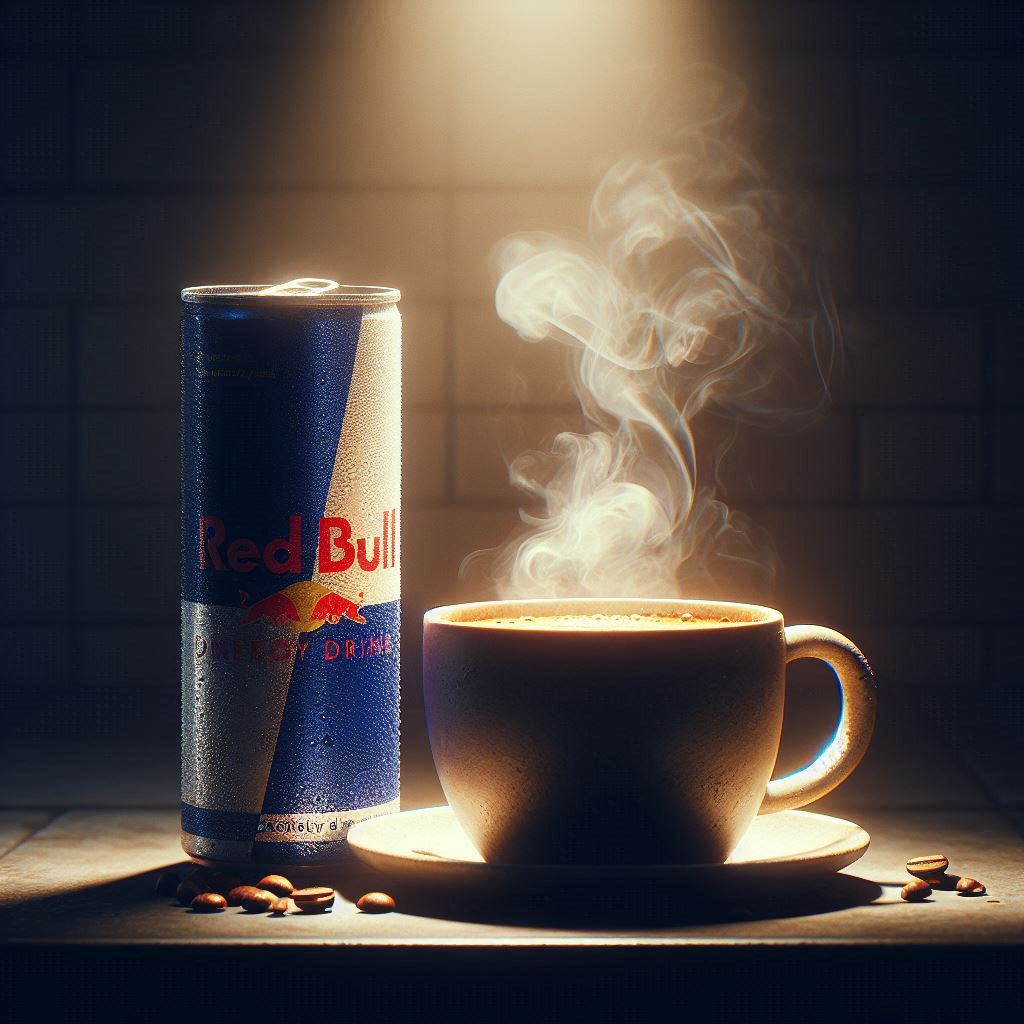Did you know that both coffee and Red Bull are among the most popular caffeinated beverages worldwide, with coffee boasting over 400 billion cups consumed annually and Red Bull selling over 7.5 billion cans in 2019? This staggering consumption has sparked a heated debate among energy seekers: coffee compared to Red Bull, which reigns supreme? As two titans in the world of pick-me-ups, these beverages have carved out distinct niches in our daily lives, each offering a unique blend of benefits and drawbacks.
In this article, we’ll dive deep into the energizing world of coffee and Red Bull, exploring their similarities, differences, and impacts on our bodies and minds. Whether you’re a dedicated coffee connoisseur, an occasional energy drink enthusiast, or simply curious about maximizing your productivity, understanding how coffee compares to Red Bull is crucial in today’s fast-paced society.
By the end of this exploration, you’ll have a comprehensive understanding of these popular stimulants, enabling you to make informed decisions about which beverage best suits your lifestyle and energy needs. We’ll examine their caffeine content, nutritional profiles, effects on performance, and potential health implications, arming you with the knowledge to choose your perfect energy boost.
Roots of the Roast
The comparison between coffee and Red Bull is rooted in humanity’s age-old quest for energy and alertness. Coffee, with its rich history dating back to the 9th century in Ethiopia, has long been revered for its stimulating properties. This aromatic brew quickly spread across the globe, becoming an integral part of diverse cultures and daily rituals.
Red Bull, on the other hand, is a relative newcomer to the energy scene. Introduced in 1987 by Austrian entrepreneur Dietrich Mateschitz, it pioneered the modern energy drink market. Inspired by functional beverages from the Far East, Red Bull was formulated to provide a quick and convenient energy boost for those seeking enhanced performance.
The evolving landscape of work and leisure in the 21st century has intensified the need for sustained energy, making the coffee compared to Red Bull debate more relevant than ever. As society grapples with longer work hours, increased screen time, and a general expectation of constant productivity, both beverages have found their place in the daily lives of millions.
Understanding the differences between these two popular stimulants is crucial for several reasons:
- Health considerations: With growing awareness of wellness and nutrition, consumers are increasingly conscious of what they put into their bodies.
- Performance optimization: Athletes, students, and professionals alike seek the most effective way to enhance their mental and physical performance.
- Lifestyle choices: The choice between coffee and Red Bull often reflects broader lifestyle preferences and values.
- Economic impact: Both industries wield significant economic influence, shaping marketing trends and consumer behavior.
By examining coffee compared to Red Bull, we gain insights not only into these specific beverages but also into broader societal trends related to energy consumption, work-life balance, and the ongoing quest for peak performance in our fast-paced world.
The Full Brewdown
Caffeine Content
When comparing coffee to Red Bull, caffeine content is a crucial factor. An average 8 oz (240 ml) cup of coffee contains about 95 mg of caffeine, while a standard 8.4 oz (250 ml) can of Red Bull provides 80 mg. At first glance, these numbers seem similar, but it’s important to consider serving sizes and consumption habits.
- Coffee drinkers often consume multiple cups throughout the day, potentially leading to higher overall caffeine intake.
- Red Bull is typically consumed in single servings, with some users limiting intake due to sugar content and price.
The caffeine in coffee is naturally occurring, while Red Bull’s caffeine is added during production. This difference doesn’t affect potency but may influence how quickly the body absorbs the caffeine.
Energy Boost and Duration
Both coffee and Red Bull provide an energy boost, but the experience can differ significantly:
- Coffee: The energy boost from coffee tends to have a gradual onset and can last for several hours. This is partly due to the presence of chlorogenic acid, which slows the release of caffeine into the bloodstream.
- Red Bull: Users often report a more immediate energy spike with Red Bull, which may be attributed to its combination of caffeine and sugar. However, this boost can be followed by a more pronounced “crash” as blood sugar levels stabilize.
A study published in the Journal of Caffeine Research found that the energy-boosting effects of coffee can last up to 6 hours, while energy drinks like Red Bull typically provide a boost for 1-2 hours.
Nutritional Profile
The nutritional profiles of coffee compared to Red Bull reveal stark differences:
- Coffee: Black coffee is virtually calorie-free and contains no sugar. It’s rich in antioxidants, particularly chlorogenic acids, which have been linked to various health benefits.
- Red Bull: A standard can contains 27 grams of sugar and 110 calories. It also includes added B-vitamins and taurine, an amino acid purported to enhance mental performance.
While Red Bull provides quick energy through its sugar content, coffee offers a calorie-free alternative that may be preferable for those monitoring their caloric intake or blood sugar levels.
Performance Enhancement
Both beverages have been studied for their effects on physical and mental performance:
- Coffee: Numerous studies have shown that coffee can improve various aspects of brain function, including memory, mood, and reaction times. A review published in Sports Medicine found that coffee can enhance endurance performance in athletes.
- Red Bull: Research has demonstrated that Red Bull can improve attention and reaction speed. A study in the journal Amino Acids found that Red Bull significantly improved aerobic endurance and anaerobic performance compared to a placebo.
While both beverages show performance benefits, coffee’s effects are primarily attributed to caffeine, whereas Red Bull’s impact may be due to the synergistic effect of caffeine, sugar, and other ingredients like taurine.
Health Implications
Long-term health effects are an important consideration when comparing coffee to Red Bull:
- Coffee: Regular coffee consumption has been associated with numerous health benefits, including reduced risk of type 2 diabetes, Parkinson’s disease, and certain types of cancer. These benefits are largely attributed to coffee’s high antioxidant content.
- Red Bull: The high sugar content in Red Bull has raised concerns about its long-term impact on metabolic health. Frequent consumption of sugary beverages has been linked to increased risk of obesity, type 2 diabetes, and cardiovascular disease.
It’s worth noting that both beverages, when consumed in excess, can lead to side effects such as insomnia, anxiety, and increased heart rate. Moderation is key for both coffee and Red Bull enthusiasts.
Taste and Versatility
The flavor profiles and versatility of these beverages also play a role in their popularity:
- Coffee: Offers a wide range of flavors depending on bean origin, roast level, and brewing method. It can be customized with various additions like milk, sugar, or flavored syrups. For those seeking a unique coffee experience, Demon’s Delight Coffee provides an intriguing option with its distinct flavor profile.
- Red Bull: Has a distinct, sweet taste that some find appealing and others find too artificial. It’s often used as a mixer in alcoholic beverages, adding another dimension to its versatility.
Cost Comparison
The financial aspect of regular consumption is worth considering:
- Coffee: Can be relatively inexpensive, especially when brewed at home. A cup of home-brewed coffee typically costs between $0.16 to $0.18.
- Red Bull: Generally more expensive per serving, with a single can costing around $2-$3 in most retail settings.
For daily consumption, coffee tends to be the more economical choice, particularly for those who prefer to prepare their beverages at home.
In the ongoing debate of coffee compared to Red Bull, it’s clear that both beverages have their place in the modern energy landscape. Coffee offers a natural, customizable energy source with potential long-term health benefits, while Red Bull provides a convenient, quick energy fix with added vitamins. The choice between the two often comes down to personal preference, lifestyle factors, and specific energy needs at any given time.
Practical Tips and Recommendations
When deciding between coffee and Red Bull, consider these actionable tips to optimize your energy boost:
- Timing is crucial:
- Coffee: Consume 30-60 minutes before needing peak alertness, as it takes time for caffeine to reach maximum effectiveness.
- Red Bull: Drink 15-30 minutes prior to needing a quick energy surge.
- Hydration matters:
- Always pair your caffeinated beverage with water to counteract potential dehydration effects.
- Monitor your intake:
- Limit coffee to 3-4 cups daily (400mg caffeine max).
- Restrict Red Bull to 1-2 cans per day due to sugar content.
- Consider your sleep schedule:
- Avoid both coffee and Red Bull 6 hours before bedtime to prevent sleep disruption.
- Experiment with coffee brewing methods:
- Try cold brew for a smoother taste and potentially less acidity.
- For a unique experience, sample Blood Brew Coffee, which offers a distinctive flavor profile.
- Customize your energy drink:
- Mix Red Bull with soda water to reduce sugar intake while maintaining the flavor.
- Pre-workout considerations:
- Coffee: Drink black coffee 30 minutes before exercise for improved endurance.
- Red Bull: Consume immediately before high-intensity, short-duration activities.
- Meal pairing:
- Combine coffee with a protein-rich breakfast for sustained energy.
- If opting for Red Bull, balance its sugar content with a small, protein-packed snack.
- Budget-friendly option:
- Make cold brew coffee concentrate at home for an economical, ready-to-drink energy boost.
- Mindful consumption:
- Pay attention to how each beverage affects your body and mood.
- Keep a journal to track energy levels, productivity, and any side effects.
By implementing these practical tips, you can make informed decisions when choosing between coffee and Red Bull, tailoring your energy intake to your specific needs and lifestyle.
Common Misconceptions
When it comes to coffee compared to Red Bull, several myths persist. Let’s debunk some of these misconceptions:
- Red Bull contains dangerously high levels of caffeine.
In reality, an 8.4 oz can of Red Bull has less caffeine (80 mg) than an average cup of coffee (95 mg). - Coffee is always healthier than Red Bull.
While coffee offers more natural benefits, moderate Red Bull consumption isn’t inherently harmful for most healthy adults. - Energy drinks like Red Bull provide longer-lasting energy than coffee.
Coffee’s effects often last longer due to its slower caffeine release. - Coffee stunts growth.
No scientific evidence supports this claim for either coffee or Red Bull. - Red Bull can replace sleep.
Neither beverage is a substitute for proper rest, despite their energizing effects. - Coffee dehydrates you more than Red Bull.
Both have mild diuretic effects, but the fluid in them generally offsets this. - Red Bull’s effects are primarily due to its unique ingredients.
Caffeine and sugar are the main active ingredients, similar to many other beverages.
Understanding these facts helps make informed choices when deciding between coffee and Red Bull for your energy needs.
Final Thoughts
Throughout this exploration of coffee compared to Red Bull, we’ve uncovered key differences and similarities between these popular energy boosters. Both offer unique benefits and potential drawbacks, catering to different needs and preferences.
Coffee stands out for its natural origins, rich antioxidant profile, and potential long-term health benefits. Its gradual, longer-lasting energy boost makes it ideal for sustained productivity. On the other hand, Red Bull provides a quick, intense energy spike, better suited for short-term performance enhancement.
Nutritionally, black coffee is calorie-free, while Red Bull’s sugar content may concern health-conscious consumers. However, Red Bull’s precise blend of ingredients can offer a more consistent energy experience for some users.
Ultimately, the choice between coffee and Red Bull depends on individual factors such as taste preferences, desired energy duration, and health considerations. Moderation is key for both beverages to avoid potential side effects.
We encourage you to experiment with different coffee brewing methods, such as trying Nocturnal Nectar Coffee, or explore sugar-free energy drink alternatives. Pay attention to how each affects your energy levels, productivity, and overall well-being. By doing so, you’ll discover the optimal energy solution for your unique lifestyle and needs.




